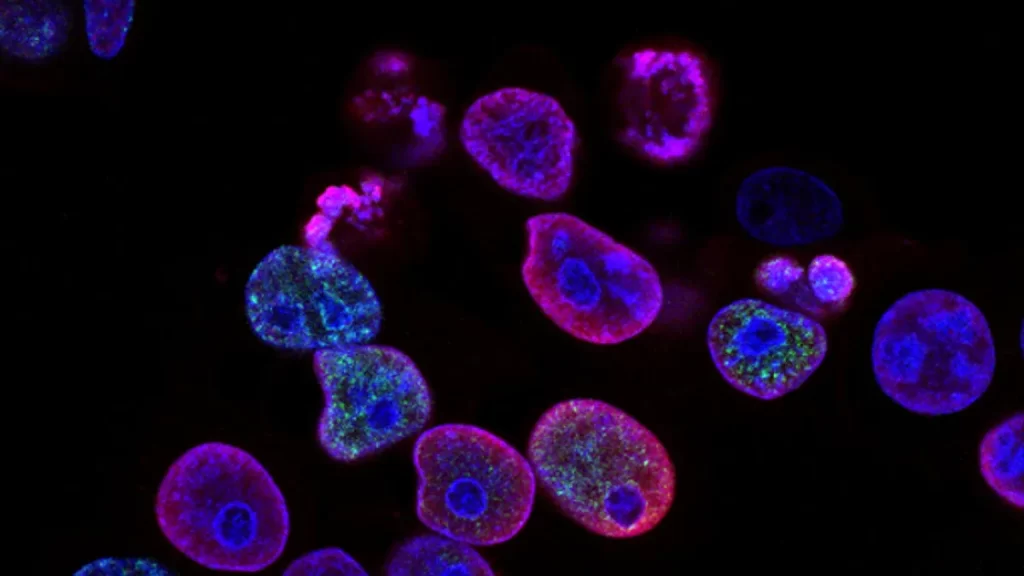News & Events
Centromere B Antibody Test and Its Role in Modern Medicine
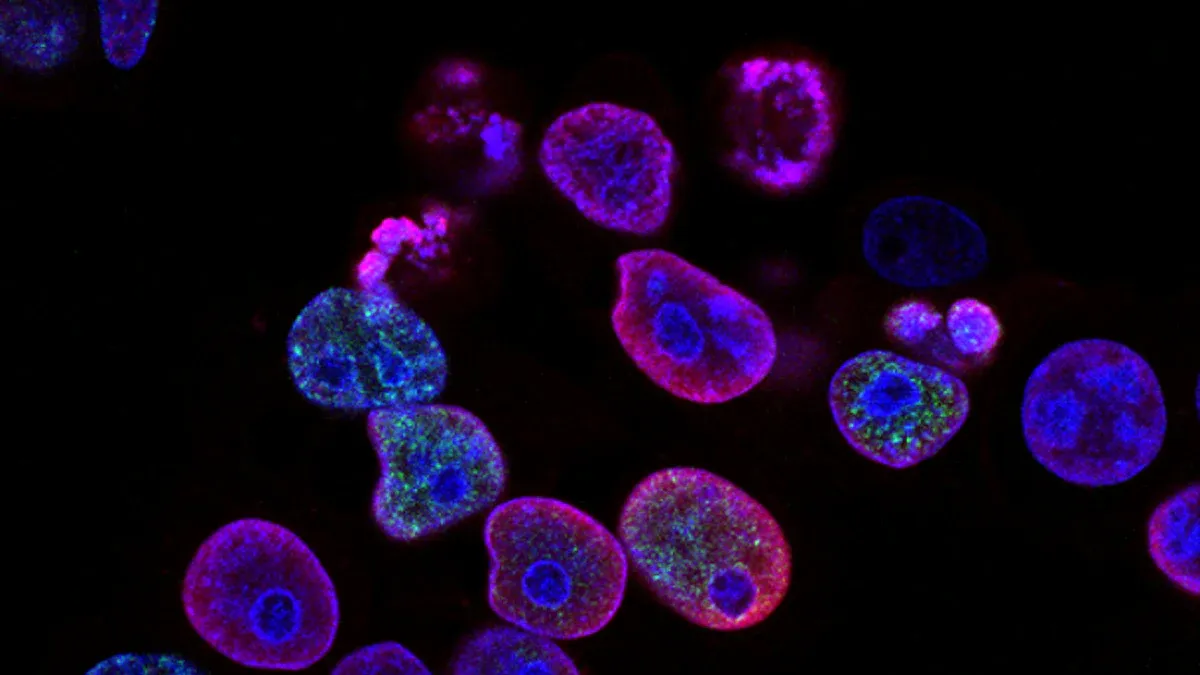
You may encounter the centromere B antibody test when doctors look for clues about autoimmune diseases. This test checks for antibodies that can signal conditions like CREST syndrome and systemic sclerosis. Early detection can help you manage symptoms and prevent complications. In patients with autoimmune diseases, the percentage of those who test positive for anti-centromere B antibodies varies:
| Group | Anti-CENP-B Antibody Positive % |
|---|---|
| Patients with Autoimmune Diseases | 1.5, 10, 37, 30, 71 |
Doctors often rely on this test to help spot disease early, especially when you may be at risk for disease progression.
Key Takeaways
- The centromere B antibody test helps doctors detect autoimmune diseases early, allowing for timely treatment and better symptom management.
- A positive test result often indicates conditions like CREST syndrome or systemic sclerosis, guiding doctors in diagnosis and treatment planning.
- The testing process is straightforward and safe, involving a simple blood draw and quick lab analysis for accurate results.
- Understanding your test results is crucial; always discuss them with your healthcare provider to plan your next steps effectively.
- Early detection through this test can lead to improved outcomes and slower disease progression, making it a valuable tool in modern medicine.
Centromere B Antibody Test
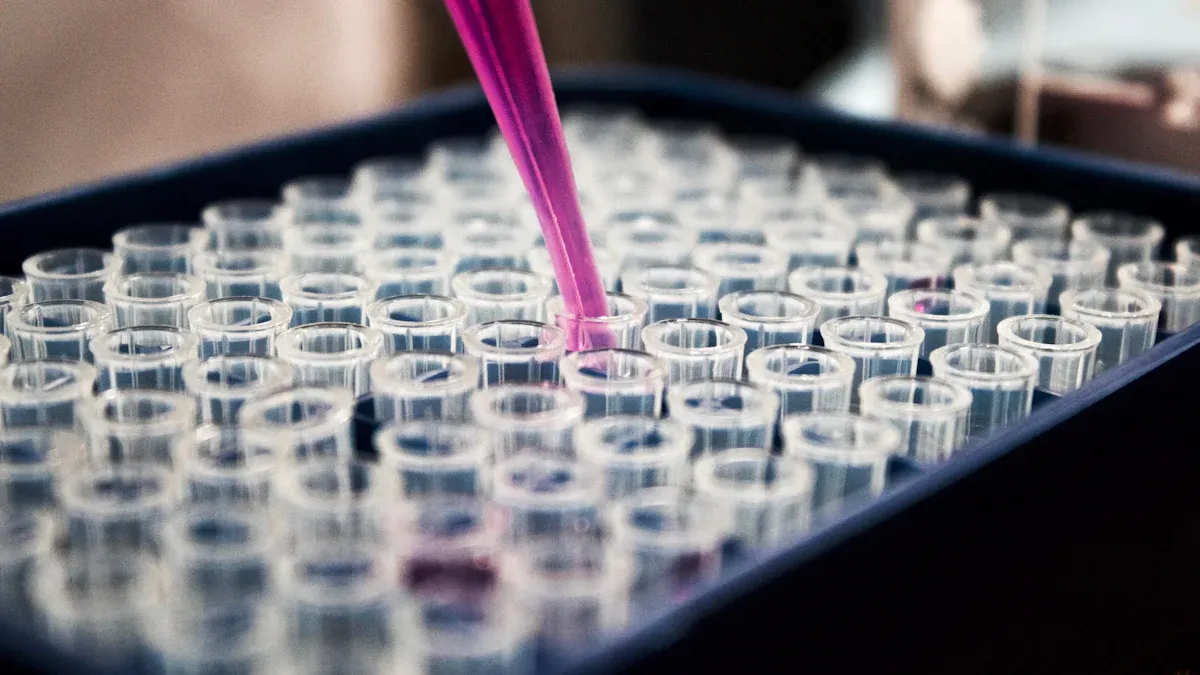
What Is Centromere B Antibody?
You may wonder what the centromere b antibody is and why it matters. This antibody targets a specific protein called CENP-B, which sits in the centromere region of your chromosomes. The centromere helps keep your genetic material stable during cell division. When your immune system makes centromere b antibody, it can signal an autoimmune problem, especially in diseases like crest syndrome.
Here is a table that shows the molecular structure and function of this antibody:
| Antibody Type | Associated Condition | Molecular Structure Description |
|---|---|---|
| Anti-centromere antibody (ACA) | CREST syndrome | Recognizes centromere protein B (CENP-B), a highly conserved mammalian centromere protein. |
The centromere b antibody recognizes CENP-B, which has a molecular weight of 80,000. All sera that test positive for anti-centromere antibodies recognize this protein. Control sera do not. This antibody plays a role in the immune response and acts as a marker for autoimmune conditions. It also shows a perfect match with anti-centromere staining when doctors use indirect immunofluorescence.
Anti-Centromere Antibody Testing
Doctors use anti-centromere antibody testing to help diagnose autoimmune diseases. This test looks for anti-centromere antibodies in your blood. You may need this test if you show signs of crest syndrome or systemic sclerosis. The anti-centromere antibody test can also help doctors check for other autoimmune problems.
You can see how the test works in the table below:
| Antigen Recognized | Molecular Weight | Recognition by ACA-positive Sera | Control Sera Recognition | Immunological Function |
|---|---|---|---|---|
| CENP-B | 80,000 | Recognized by all ACA-positive sera | None | Shows 100% correlation with anti-centromere staining by indirect immunofluorescence. |
Doctors rely on anti-centromere antibody testing because it helps them find crest syndrome early. Early detection means you can start treatment sooner and manage symptoms better. The anti-centromere antibody test is also important for checking if you have other autoimmune diseases, such as primary biliary cholangitis or rheumatoid arthritis.
Test Process
You may want to know what happens during the anti-centromere antibody test. The process is simple and safe. Your doctor will collect a blood sample using a serum separator tube. The lab staff will separate the serum from the blood cells as soon as possible, usually within two hours. They will then transfer the serum to a special transport tube.
Here is a quick list of what happens during the test:
- The lab uses a serum separator tube to collect your blood.
- They separate the serum from the cells quickly.
- The serum is stored in a refrigerator until testing.
- The lab uses a semi-quantitative multiplex bead assay to check for anti-centromere antibodies.
- The test runs every day of the week.
- You usually get your results in 1 to 3 days, but some labs may take longer.
| Source | Turnaround Time |
|---|---|
| LabCorp | 14 – 21 days |
| Kent Laboratory | Batch tested Tuesday, Wednesday and Friday |
| Ultalab Tests | Average 1 to 2 business days |
| Barnes-Jewish Hospital | Results available day of testing |
Tip: Make sure your blood sample is not contaminated or hemolyzed. This helps the lab get accurate results.
The anti-centromere antibody test gives your doctor important information. It helps them decide if you have crest syndrome or another autoimmune disease. Early testing can make a big difference in your care. If you have symptoms like tight skin, swollen fingers, or trouble swallowing, your doctor may order this test to help find the cause.
Diagnosis and Clinical Use
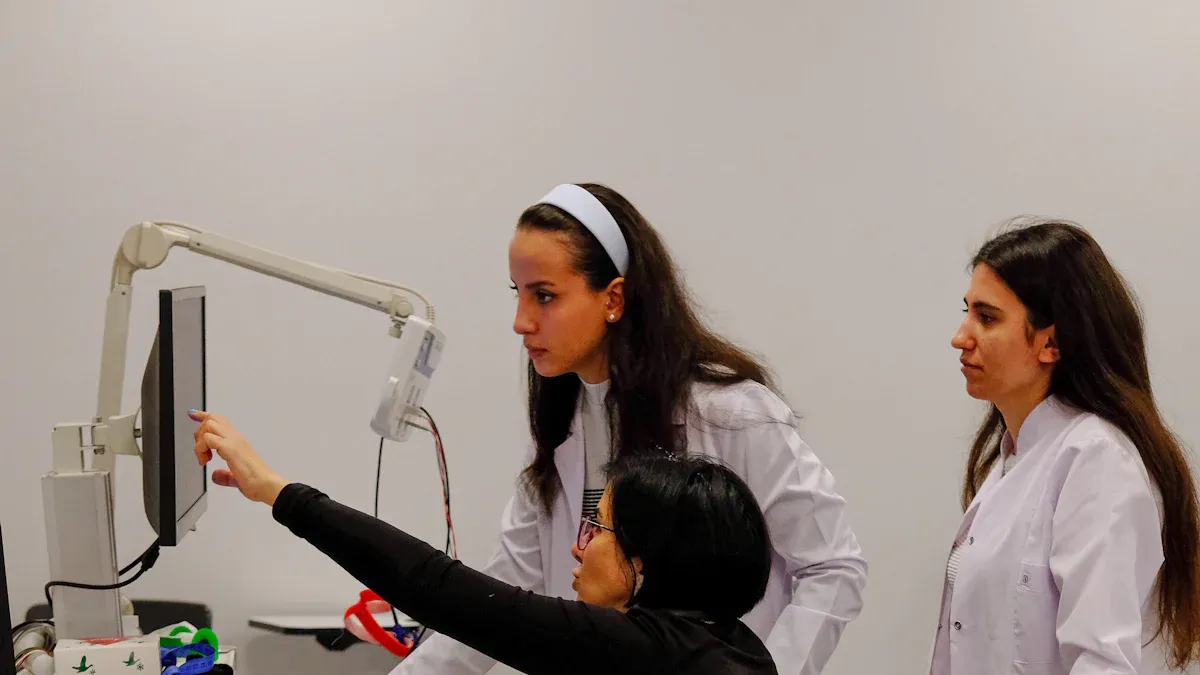
CREST Syndrome and Systemic Sclerosis
You may hear your doctor talk about scleroderma, crest, or systemic sclerosis. These are autoimmune disorders that can affect your skin, blood vessels, and organs. The anti-centromere antibody test plays a key role in crest syndrome diagnosis and in finding limited forms of scleroderma. When you have crest syndrome, your immune system makes anticentromere autoantibodies that target parts of your own cells.
More than half of patients with crest syndrome show elevated levels of anticentromere autoantibodies. This means the anti-centromere antibody test often gives positive results in crest syndrome diagnosis. The test also helps with systemic sclerosis diagnosis, especially when you have the limited type. Doctors use the test to check for these autoantibodies and to guide your treatment plan.
| Autoantibody Type | β Value | 95% Confidence Interval | p-value |
|---|---|---|---|
| Anti-centromere | 0.002 | (0.001 to 0.003) | <0.001 |
| Anti-RNA polymerase III | 0.143 | (0.066 to 0.220) | 0.002 |
This table shows how the presence of anti-centromere autoantibodies links to disease progression in systemic sclerosis. The anti-centromere antibody test helps your doctor understand how your scleroderma may develop over time. If you have positive results, your doctor may focus on crest syndrome diagnosis and adjust your care.
Other Autoimmune Diseases
The anti-centromere antibody test does not only help with scleroderma or crest syndrome diagnosis. You may also need this test if your doctor suspects other autoimmune diseases. These include Sjögren’s syndrome, primary biliary cholangitis, and rheumatoid arthritis. The test checks for anticentromere autoantibodies, which can appear in several autoimmune disorders.
| Autoimmune Disease | Prevalence of ACA (%) |
|---|---|
| Sjögren’s syndrome (SS) | 4.7 |
| Primary biliary cholangitis (PBC) | 9–30 |
This table shows that anticentromere autoantibodies appear in a small number of patients with Sjögren’s syndrome and in up to 30% of those with primary biliary cholangitis. The anti-centromere antibody test helps your doctor rule in or rule out these autoimmune diseases. It also helps with diagnosis when symptoms overlap between different autoimmune disorders.
When Is the Test Ordered?
Doctors order the anti-centromere antibody test when you show signs of crest syndrome, scleroderma, or other autoimmune diseases. You may notice certain symptoms that prompt your doctor to check for anticentromere autoantibodies. These symptoms include:
- Calcinosis: calcium deposits under your skin
- Raynaud phenomenon: fingers or toes turning white or blue in cold or stress
- Esophageal dysfunction: trouble swallowing, acid reflux, or heartburn
- Sclerodactyly: tight, thick, shiny skin on your hands and fingers
- Telangiectasia: small red spots on your skin from swollen blood vessels
Your doctor may also order the test if you have risk factors for scleroderma or crest. The anti-centromere antibody test helps with early diagnosis and guides your treatment. When you get positive results, your doctor can focus on crest syndrome diagnosis or scleroderma management. The test results help your doctor decide which treatments may work best for your type of autoimmune disease.
Note: The anti-centromere antibody test gives your doctor important information about your autoimmune disease. It helps with diagnosis, guides treatment, and tracks your disease over time.
The anti-centromere antibody test is a valuable tool for crest syndrome diagnosis, scleroderma, and other autoimmune disorders. It checks for anticentromere autoantibodies, helps with early diagnosis, and supports your doctor in making the best treatment decisions for you.
Test Results and Interpretation
Positive and Negative Results
When you receive your anti-centromere antibody test, you will see a clear reference range. The lab uses specific values to decide if your test is positive or negative. Here is a table to help you understand your result:
| Result Interpretation | Value (IU) | Value (AI) |
|---|---|---|
| Negative | < 1.0 | ≤ 1.0 |
| Positive | ≥ 1.0 |
A negative result means your value is below the cutoff. A positive result means your value meets or exceeds the cutoff. Your doctor will use these numbers to help decide what your test means for your health.
Implications for Diagnosis
A positive anti-centromere antibody test can give your doctor important clues. This test is highly specific for systemic sclerosis, especially the limited cutaneous type. In fact, centromere antibodies appear in 20% to 40% of patients with systemic sclerosis. You may also see a positive test in other diseases, such as lupus, primary biliary cholangitis, rheumatoid arthritis, or Sjögren syndrome. The presence of these antibodies often points to a lower risk of heart and kidney problems, but a higher risk of lung issues like pulmonary arterial hypertension.
| Evidence | Description |
|---|---|
| Association with SSc | Centromere antibodies are found in 20% to 40% of patients with systemic sclerosis (SSc) and are linked to the lcSSc subtype. |
| Prognostic Implications | Presence of centromere antibodies indicates a lower risk of cardiac and renal involvement but a higher risk of pulmonary arterial hypertension (PAH). |
| CREST Syndrome | A positive test for centromere antibodies is strongly associated with CREST syndrome, potentially appearing before clinical features. |
The anti-centromere antibody test stands out for its high specificity (99.9%) in diagnosing systemic sclerosis. This makes your result very reliable for this condition.
🧠 Note: Some people feel emotional distress after a positive result. You may feel worried or anxious, especially if you have symptoms. This is common, and you should talk to your doctor about any concerns.
Next Steps After Testing
After you get your anti-centromere antibody test result, you should follow up with your healthcare provider. Your doctor will look at your test along with your symptoms and medical history. You may need more tests to check for organ involvement or other autoimmune diseases. Sometimes, your doctor will suggest lifestyle changes or start treatment to help manage your condition.
- Schedule a follow-up visit to discuss your result.
- Ask your doctor if you need more tests based on your symptoms.
- Consider emotional support if you feel stressed or anxious.
- Repeat testing is not usually needed unless your health changes or your doctor has a specific reason.
| Recommendation | Description |
|---|---|
| Avoid repeat testing | Repeat autoantibody evaluations should be avoided unless there is a significant change in your health. |
| Not recommended for negative results | If your first test is negative, you usually do not need another test. |
| Titer change assessment | Your doctor may repeat the test if you have a positive result and your treatment plan depends on it. |
The anti-centromere antibody test gives you and your doctor a strong tool for early diagnosis and management. Always talk with your healthcare provider to understand your result and plan your next steps.
Limitations and Considerations
Test Accuracy
You may wonder how accurate the centromere B antibody test is for diagnosing scleroderma and limited cutaneous scleroderma. The test shows high specificity, which means it rarely gives a false positive. For example, when doctors use the test for scleroderma in normal controls, the specificity reaches 99.9%. The sensitivity, or the ability to detect the disease when it is present, is lower. In normal controls, the sensitivity for scleroderma is 33%. For limited cutaneous scleroderma, the sensitivity rises to 65%, with the same high specificity.
| Condition | Sensitivity (%) | Specificity (%) |
|---|---|---|
| Normal controls (SSc) | 33 | 99.9 |
| Other connective tissue diseases | 31 | 95-97 |
| Primary Raynaud’s phenomenon | 24 | 90 |
| Normal controls (CREST) | 65 | 99.9 |
| Other connective tissue diseases | 61 | 98 |
| Primary Raynaud’s phenomenon | 60 | 83 |
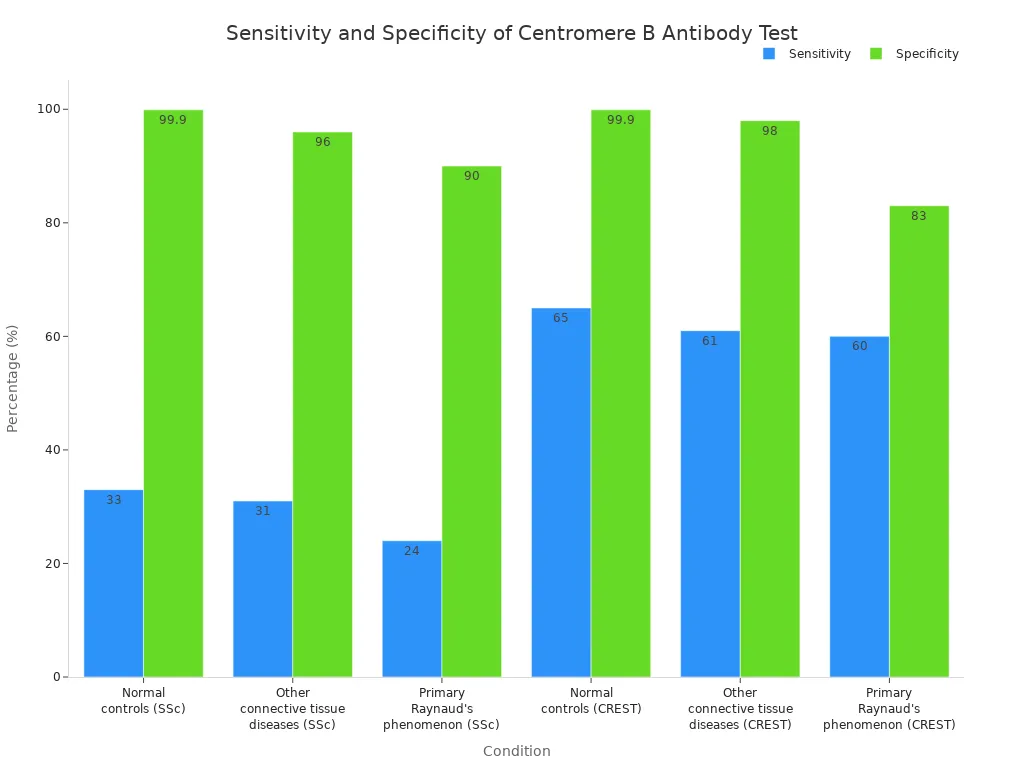
Limitations in Diagnosis
The centromere B antibody test helps you and your doctor find scleroderma, especially limited cutaneous scleroderma. However, the test does not catch every case. Some people with scleroderma or limited cutaneous scleroderma may have a negative result. You may also see a positive test in other autoimmune diseases, which can make diagnosis harder. The test cannot show how severe your scleroderma is or predict how fast it will progress. Doctors use the test as one part of your diagnosis, not the only tool.
Note: You should not rely on a single test to confirm or rule out scleroderma or limited cutaneous scleroderma.
Comprehensive Evaluation
You need a comprehensive evaluation to understand your health fully. Your doctor will look at your symptoms, physical exam, and other lab results. The centromere B antibody test gives important clues, but it works best when combined with other information. You may need more tests to check for organ involvement or to rule out other diseases. This approach helps your doctor give you the best care for scleroderma and limited cutaneous scleroderma.
You can use the centromere B antibody test to help doctors diagnose autoimmune diseases early. Early detection lets you start treatment quickly and manage symptoms better.
- Doctors have found anti-centromere antibodies in patients years before symptoms appear.
- Patients with Raynaud’s phenomenon and these antibodies have a higher risk of developing systemic sclerosis.
- Early testing and treatment often lead to better outcomes and slower disease progression.
You should always talk with your healthcare provider to understand your results and plan your next steps.
FAQ
What does a positive centromere B antibody test mean?
A positive result shows you have centromere B antibodies in your blood. This often points to systemic sclerosis or CREST syndrome. Your doctor may use this result to guide your diagnosis and treatment.
Tip: Always ask your doctor what your result means for your health.
Can you have a negative test and still have an autoimmune disease?
Yes, you can. Some people with autoimmune diseases do not show centromere B antibodies. Your doctor may order other tests to help find the cause of your symptoms.
| Test Result | Possible Condition |
|---|---|
| Negative | Autoimmune disease still possible |
How do doctors use this test with other lab results?
Doctors look at your test result along with your symptoms and other lab tests. You may need tests for organ function or other antibodies. This helps your doctor make a complete diagnosis.
- Blood tests
- Physical exam
- Imaging studies
Is the centromere B antibody test painful or risky?
You will feel a small pinch when the nurse draws your blood. The test is safe. Most people do not have side effects. If you feel dizzy or sore, tell your nurse.
🩺 Note: Drink water before your test to help your veins show up.

